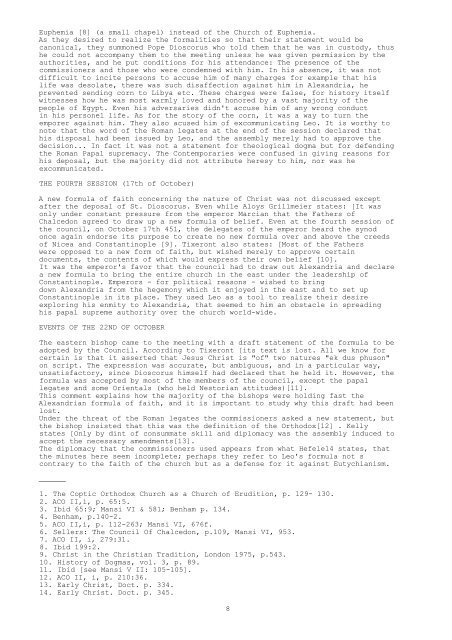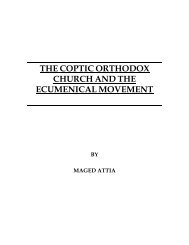Coptic interpretations of the Fourth Ecumenical Council - Saint Mina ...
Coptic interpretations of the Fourth Ecumenical Council - Saint Mina ...
Coptic interpretations of the Fourth Ecumenical Council - Saint Mina ...
Create successful ePaper yourself
Turn your PDF publications into a flip-book with our unique Google optimized e-Paper software.
Euphemia [8] (a small chapel) instead <strong>of</strong> <strong>the</strong> Church <strong>of</strong> Euphemia.<br />
As <strong>the</strong>y desired to realize <strong>the</strong> formalities so that <strong>the</strong>ir statement would be<br />
canonical, <strong>the</strong>y summoned Pope Dioscorus who told <strong>the</strong>m that he was in custody, thus<br />
he could not accompany <strong>the</strong>m to <strong>the</strong> meeting unless he was given permission by <strong>the</strong><br />
authorities, and he put conditions for his attendance: The presence <strong>of</strong> <strong>the</strong><br />
commissioners and those who were condemned with him. In his absence, it was not<br />
difficult to incite persons to accuse him <strong>of</strong> many charges for example that his<br />
life was desolate, <strong>the</strong>re was such disaffection against him in Alexandria, he<br />
prevented sending corn to Libya etc. These charges were false, for history itself<br />
witnesses how he was most warmly loved and honored by a vast majority <strong>of</strong> <strong>the</strong><br />
people <strong>of</strong> Egypt. Even his adversaries didn't accuse him <strong>of</strong> any wrong conduct<br />
in his personel life. As for <strong>the</strong> story <strong>of</strong> <strong>the</strong> corn, it was a way to turn <strong>the</strong><br />
emporer against him. They also acused him <strong>of</strong> excommunicating Leo. It is worthy to<br />
note that <strong>the</strong> word <strong>of</strong> <strong>the</strong> Roman legates at <strong>the</strong> end <strong>of</strong> <strong>the</strong> session declared that<br />
his disposal had been issued by Leo, and <strong>the</strong> assembly merely had to approve <strong>the</strong><br />
decision... In fact it was not a statement for <strong>the</strong>ological dogma but for defending<br />
<strong>the</strong> Roman Papal supremacy. The Contemporaries were confused in giving reasons for<br />
his deposal, but <strong>the</strong> majority did not attribute heresy to him, nor was he<br />
excommunicated.<br />
THE FOURTH SESSION (17th <strong>of</strong> October)<br />
A new formula <strong>of</strong> faith concerning <strong>the</strong> nature <strong>of</strong> Christ was not discussed except<br />
after <strong>the</strong> deposal <strong>of</strong> St. Dioscorus. Even while Aloys Grillmeier states: [It was<br />
only under constant pressure from <strong>the</strong> emperor Marcian that <strong>the</strong> Fa<strong>the</strong>rs <strong>of</strong><br />
Chalcedon agreed to draw up a new formula <strong>of</strong> belief. Even at <strong>the</strong> fourth session <strong>of</strong><br />
<strong>the</strong> council, on October 17th 451, <strong>the</strong> delegates <strong>of</strong> <strong>the</strong> emperor heard <strong>the</strong> synod<br />
once again endorse its purpose to create no new formula over and above <strong>the</strong> creeds<br />
<strong>of</strong> Nicea and Constantinople [9]. Tixeront also states: [Most <strong>of</strong> <strong>the</strong> Fa<strong>the</strong>rs<br />
were opposed to a new form <strong>of</strong> faith, but wished merely to approve certain<br />
documents, <strong>the</strong> contents <strong>of</strong> which would express <strong>the</strong>ir own belief [10].<br />
It was <strong>the</strong> emperor's favor that <strong>the</strong> council had to draw out Alexandria and declare<br />
a new formula to bring <strong>the</strong> entire church in <strong>the</strong> east under <strong>the</strong> leadership <strong>of</strong><br />
Constantinople. Emperors - for political reasons - wished to bring<br />
down Alexandria from <strong>the</strong> hegemony which it enjoyed in <strong>the</strong> east and to set up<br />
Constantinople in its place. They used Leo as a tool to realize <strong>the</strong>ir desire<br />
exploring his enmity to Alexandria, that seemed to him an obstacle in spreading<br />
his papal supreme authority over <strong>the</strong> church world-wide.<br />
EVENTS OF THE 22ND OF OCTOBER<br />
The eastern bishop came to <strong>the</strong> meeting with a draft statement <strong>of</strong> <strong>the</strong> formula to be<br />
adopted by <strong>the</strong> <strong>Council</strong>. According to Tixeront [its text is lost. All we know for<br />
certain is that it asserted that Jesus Christ is "<strong>of</strong>" two natures "ek dus phuson"<br />
on script. The expression was accurate, but ambiguous, and in a particular way,<br />
unsatisfactory, since Dioscorus himself had declared that he held it. However, <strong>the</strong><br />
formula was accepted by most <strong>of</strong> <strong>the</strong> members <strong>of</strong> <strong>the</strong> council, except <strong>the</strong> papal<br />
legates and some Orientals (who held Nestorian attitudes)[11].<br />
This comment explains how <strong>the</strong> majority <strong>of</strong> <strong>the</strong> bishops were holding fast <strong>the</strong><br />
Alexandrian formula <strong>of</strong> faith, and it is important to study why this draft had been<br />
lost.<br />
Under <strong>the</strong> threat <strong>of</strong> <strong>the</strong> Roman legates <strong>the</strong> commissioners asked a new statement, but<br />
<strong>the</strong> bishop insisted that this was <strong>the</strong> definition <strong>of</strong> <strong>the</strong> Orthodox[12] . Kelly<br />
states [Only by dint <strong>of</strong> consummate skill and diplomacy was <strong>the</strong> assembly induced to<br />
accept <strong>the</strong> necessary amendments[13].<br />
The diplomacy that <strong>the</strong> commissioners used appears from what Hefele14 states, that<br />
<strong>the</strong> minutes here seem incomplete; perhaps <strong>the</strong>y refer to Leo's formula not s<br />
contrary to <strong>the</strong> faith <strong>of</strong> <strong>the</strong> church but as a defense for it against Eutychianism.<br />
1. The <strong>Coptic</strong> Orthodox Church as a Church <strong>of</strong> Erudition, p. 129- 130.<br />
2. ACO II,i, p. 65:5.<br />
3. Ibid 65:9; Mansi VI & 581; Benham p. 134.<br />
4. Benham, p.140-2.<br />
5. ACO II,i, p. 112-263; Mansi VI, 676f.<br />
6. Sellers: The <strong>Council</strong> Of Chalcedon, p.109, Mansi VI, 953.<br />
7. ACO II, i, 279:31.<br />
8. Ibid 199:2.<br />
9. Christ in <strong>the</strong> Christian Tradition, London 1975, p.543.<br />
10. History <strong>of</strong> Dogmas, vol. 3, p. 89.<br />
11. Ibid [see Mansi V II: 105-105].<br />
12. ACO II, i, p. 210:36.<br />
13. Early Christ, Doct. p. 334.<br />
14. Early Christ. Doct. p. 345.<br />
8








